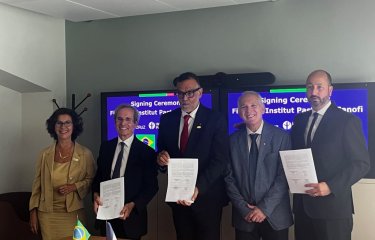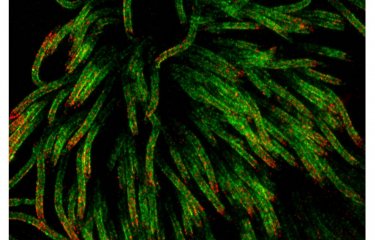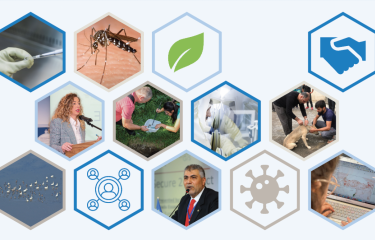On Friday February 14, 2020, Stewart Cole, President of the Institut Pasteur, played host to His Excellency Mr Lu Shaye, Chinese Ambassador to France, who was visiting the Institut Pasteur to show support both personally and on behalf of his country for the Institut Pasteur’s efforts in response to the novel coronavirus outbreak. The visit provided an opportunity to introduce the ambassador and his delegation to teams of scientists assigned to monitoring the outbreak and present research projects launched under the auspices of the new task force with a view to tackling the outbreak in partnership with the health authorities and other relevant institutions. It also offered a chance to highlight the commitment shown by all member institutes of the Institut Pasteur International Network in Paris, Shanghai and throughout the world.
The outbreak of the novel coronavirus (initially known as 2019-nCoV before it was officially named SARS-CoV-2 – see fact sheet) emerged in the city of Wuhan (Hubei province, China) in December 2019 and now affects many countries throughout the world. Global solidarity offered by the Institut Pasteur International Network has enabled institutes to work in close partnership to speed up access to diagnosis and treatment development with a view to halting the outbreak as quickly as possible. Given these circumstances, China was keen to show its support for research teams mobilized at the Institut Pasteur. Franco-Chinese cooperation has already proven successful in the past, the commitment shown by the Institut Pasteur during the SARS outbreak of 2003 being one key example.
Official visit of the Chinese Ambassador to France
While visiting the Institut Pasteur in Paris, the Chinese Ambassador, His Excellency Mr Lu Shaye met scientists involved in managing the novel coronavirus outbreak, including Sylvie Van der Werf, head of the National Reference Center for Respiratory Viruses, Jean-Claude Manuguerra, head of the Laboratory for Urgent Response to Biological Threats (CIBU), Olivier Schwartz, head of the Virus and Immunity Unit, and Philippe Sansonetti, head of the Center for Microbes in Development and Health at the Institut Pasteur of Shanghai, Chinese Academy of Sciences. Accompanied by his delegation, he expressed his support for the Institut Pasteur's response and thanked its scientists. His Excellency Mr Lu Shaye and Prof. Stewart Cole both highlighted the fact that countries step up their cooperation in such times of adversity.
- In line with its mission to monitor influenza and respiratory viruses in France, the Institut Pasteur in Paris has mobilized teams at the French National Reference Center (CNR) for Respiratory Viruses and the Laboratory for Urgent Response to Biological Threats (CIBU) to confirm suspected cases of acute respiratory infection linked to the novel coronavirus (now named SARS-CoV-2). Thanks to the concerted efforts of these two laboratories, the Institut Pasteur is in a position to respond 24/7 to requests from health authorities as they deal with this previously unknown virus.
The Chinese delegation visited the laboratory run by Sylvie van der Werf, head of the National Reference Center for Respiratory Viruses at the Institut Pasteur. The Institut Pasteur tested samples taken from the first confirmed cases in tandem with the health authorities and hospitals that took the samples from these initial patients. This led to the Institut Pasteur announcing on January 31, 2020 that it had isolated strains of the novel coronavirus (SARS-CoV-2) detected in France. During this isolation process, the Institut Pasteur sequenced the entire genome of the novel coronavirus (SARS-CoV-2) and shared this sequence with the international scientific community. Genome sequencing has enabled viruses to be compared in order to reconstruct potential transmission chains in France and examine virus mutations at global level.
Isolating the virus responsible for the current outbreak paves the way to researching new diagnostic, therapeutic, and prophylactic approaches.
In response to the announcement of the first cases and the declaration of the outbreak by the Chinese authorities, the Institut Pasteur in Paris has set up a task force for the novel coronavirus. One of the first jobs for the task force has been to identify three specific research areas in which the Institut Pasteur has particular expertise and to map its current projects to these areas. Several Institut Pasteur teams are represented on the task force, which will focus its research on various scientific areas:
- Understanding more about the virus and its pathogenesis;
- Developing new diagnostic tools and searching for antibodies that may have therapeutic applications;
- Vaccine development;
- Epidemiology and modeling to develop outbreak control strategies.
- Network member institutes in Asia have implemented a diagnostic test for the SARS-CoV-2 virus based on a protocol proposed by the University of Hong Kong, a WHO Collaborating Center. This test is now being rolled out globally.
The Institut Pasteur of Shanghai - Chinese Academy of Sciences, which was set up in 2004 to respond to emerging infectious diseases, is currently working with the Chinese authorities, which have given it direct access to patients via the university hospital platform in Hefei. Drawing on its Franco-Chinese governance and international working environment, the Institut Pasteur of Shanghai, Chinese Academy of Sciences is playing a key role as an incubator/accelerator of collaborative projects between French teams (Inserm, CNRS, Institut Pasteur) and Chinese teams.
The Institut Pasteur of Shanghai and the Hong Kong University-Pasteur Research Pole have supported countries in the region with more vulnerable health systems.
Along with the Institut Pasteur du Cambodge, which has also played an active role since the beginning of the outbreak, they have provided assistance to the Institut Pasteur du Laos, which has been designated as a front-line diagnostic laboratory by the Laotian Ministry of Health.
- Network member institutes in Africa are preparing for the outbreak’s arrival on the continent by putting in place protocols and diagnostic equipment widely distributed by the Hong Kong University-Pasteur Research Pole and the Charité team in Germany.
The Pasteur International Network association is coordinating the response in the various regions. Regions are given access to existing capacity boosting programs such as the program backed by the US Health Department on monitoring and preparing for emerging infectious diseases and the MediLaBSecure program backed by the European Union, whose focus is on upskilling in reference laboratories.
Moreover, most International Network member institutes in Africa are recognized as reference centers at national level and some, such as the Institut Pasteur de Dakar, are Regional Reference Centers of the West African Health Organization (WAHO). In this role, the Institut Pasteur de Dakar organizes events such as the training session on enhanced outbreak preparation measures offered to 15 African countries between February 6 and 8.
It is crucial to organize an effective response at global level due to links between the focus of infection in Asia and the challenge posed by the African continent with its less robust health systems, which could allow the outbreak to spread quickly.





